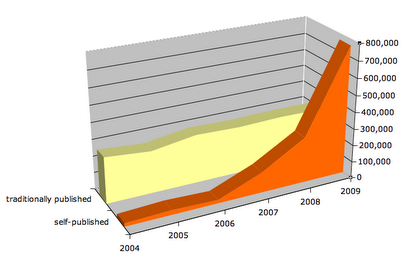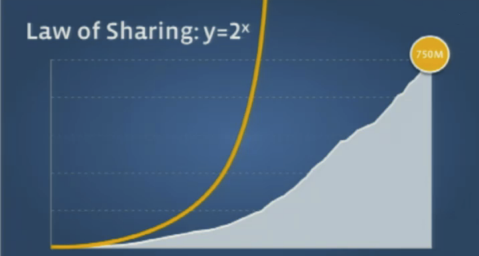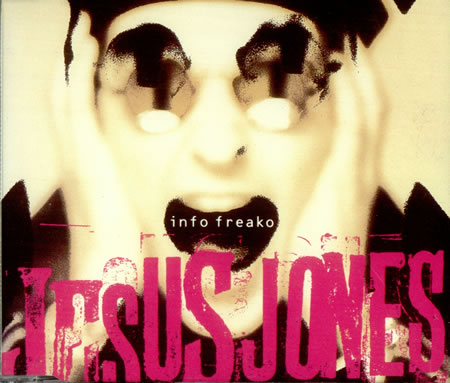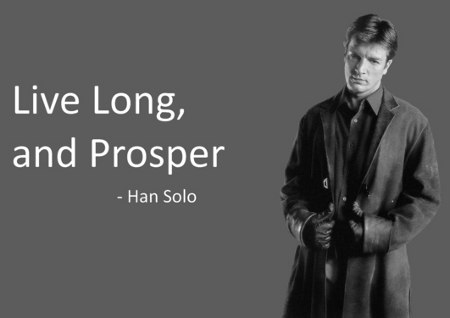Is information overload a problem our new digital society must solve or are we changing how we learn?
Information Overload
We’ve gone from a handful of TV channels to more than 500; from a few radio stations to streaming music on demand; from reading the local newspaper to reading publications from around the world.
The Extracting Value from Chaos report from IDC iView provides a staggering overview of our digital footprint.
In 2011, the amount of information created and replicated will surpass 1.8 zettabytes (1.8 trillion gigabytes) – growing by a factor of 9 in just five years.
It’s not just digital either. We see this trend in the publishing industry where print-on-demand and self-published books have skyrocketed (pdf).

This does not include Audio or eBooks.
Of course, we’re also sharing all of this information at an accelerated rate.

Zuckerberg’s Law of Sharing states that sharing activity will double each year.
You know that information is increasing, but you might not realize just how much and how fast it is increasing.
Curation
As the amount of information increases many have looked at ways to sift through and make sense of it all. The goal is to find signal amid the noise. Plenty of folks are trying to apply different techniques and algorithms to winnow things down to only the most interesting and relevant.
KnowAboutIt, XYDO, My6Sense, Trunk.ly and Summify among others are all trying to cull the web and deliver the ‘right’ information to your inbox.
Aggregated social curation sounds logical but I haven’t found it very valuable. I find the stuff I already read (or would have found) anyway. Maybe it works if you’re not drinking from the information hose, but most of us are doing more of that in one way or the other. I can’t imagine relying on just these services for my information.
Many believe that serendipity is an important part of information consumption, but most of the services give this lip service at best. They’re doing more of what a good brand marketer would do, cranking out extensions to a known product. In this case that product is the type of content that you and your network of ‘friends’ are reading. I think you quickly reach a local maxima where you’re not finding new things and making new connections.
Today’s curation seems more like an echo chamber.
Distraction

Nicholas Carr thinks the Internet is doing evil things to us and Google might be making us stupid. NPR books summarizes Carr’s thesis as follows.
Carr believes that the Internet is a medium based on interruption — and it’s changing the way people read and process information. We’ve come to associate the acquisition of wisdom with deep reading and solitary concentration, and he says there’s not much of that to be found online.
Carr might be right about the distraction of the Internet. But this is but one way in which we acquire information. I watch two hour movies straight through, can read a book for hours at a stretch and still conduct lengthy phone calls. The idea that we can only process information in one way seems like an odd conclusion. It would be like saying that because we possess the ability to drive that athletic prowess will decline.
Taking it a step further, there is an assumption that we process information uniformly. Here’s where fiction helps reveal a greater truth. The Ghost In Love by Jonathan Carroll explores the division of personality. We are different people throughout our lives, day-by-day and even different people at the same time.
How can we be kind when you were so mean to that stranger the other day? How can we be intelligent when you made such a stupid mistake the other week? Many people struggle with this seeming paradox. But we’re not robots! We’re not just one monolithic entity that does things the same way every day. Not only do we evolve over time (just think about your musical tastes) but we’ll react to information in different ways on an hourly basis. Much of this has to do with context, but I think there are more complex factors at work.
So why do we persist in this notion that we can only comprehend information in one way. That’s just patently untrue.
Cut-Up Learning
The cut-up technique was made popular by William Burroughs and is performed by cutting up content and putting it back together in a different order. By doing so, it reveals new words, new insight and new meaning. It’s a type of non-linear learning.
I believe the Internet, the great distractor, is a digital version of the cut-up technique. It is actually more powerful because we can cut-up more information from a wide variety of topics and mediums.
We’re so consumed with capturing just the right thing, those few articles that will provide insight, that we miss the opportunity to piece together and make connections to a larger puzzle.
The goal isn’t to curate and aggregate the content into neat little packages but to cut up the information to unlock trends and insight.
Skimming
I read a large number of RSS feeds, a diverse blend of literature, photography, analytics, SEO, technology, life hacking, science, local, marketing, design, UX, humor and start-up related blogs. I also let the river of information flow through platforms like FriendFeed, Google+, Pinterest and Twitter.
Do I read every post word for word? No. I’m skimming a lot of the time, both in terms of the type of content that is being generated (the theme and pulse of activity) and the actual content itself. Skimming doesn’t mean I’m not getting value from that content. By skimming through a variety of pieces, topics and media I create a very different view of the data that is swirling around me.
That also doesn’t prevent me from taking a deep dive on any given piece I find. In fact, I’d hazard that I locate more of these pieces through the act of skimming.
Cut-Up Example

So lets go from theory to practice. I believe Google is extremely interested in creating some sort of AuthorRank based on the quality of and engagement with the content that author produces. Here’s the cut-up that leads me to this conclusion.
I watch Steven Levy interviewed by Matt Cutts, and find both Levy’s mention of being outranked by Huffington Post interesting but also note the look Cutts gives someone in the audience directly after this remark. I watch this video after authorship is rolled out by Google at SMX Advanced. This is an example of how the cut-up technique doesn’t need to be linear.
I keep track of the debate around identity on Google+ and see how their inflexibility on the issue is rooted in ensuring confidence in authorship. I watch the high rate of iteration in the rel=”author” program and note who is leading those efforts. I look at which Google Webmaster Central videos in this latest series are released first. Because they record them in large chunks, so the authorship video getting to the head of the line signals a sort of priority.
I read about the acquisitions of companies that measure engagement with content. I ask questions about what Google is doing with PostRank and (repeatedly) get no response. Silence can be a very loud signal.
Those are all signals within the actual topic, though they might be in different media. But I also pay close attention to how Facebook is implementing EdgeRank and note the direction LinkedIn is going as well. Again, those are closely related to authorship and identity so it’s not going too far afield.
But there are other vectors that might seem unrelated. I listen to artists who are irate at how their work is taken and used without credit. I key in on articles that highlight the music that is most often sampled by new artists. I listen to the Rick Astley and Nirvana mashup. I laugh at the misattributed quote meme but also think about what it represents. I uncover distasteful social proof manipulation and dive into the argument about influence and whether Klout is accurate.
Alone, each of these things are of passing interest, but with access to so much information I find greater context and meaning.
Mind Hacking
The digital age allows us to peer over the shoulders of more people. A lot of them may provide little to no value but some will be intelligent and provide thoughtful commentary and links. I’ve become adept at quickly recognizing the difference. It’s reminiscent of what Gladwell talks about in Blink.
Maybe I am an outlier and my information consumption behavior is non-traditional, but given the rate in which information is accelerating I believe more and more people will adopt (or be forced into) this type of cut-up learning.
I used to scoff at the number of people Robert Scoble followed, invoking Dunbar’s Number as my defense. What I’ve realized is that there is a vast difference in social relationships versus information discovery.
I still believe in Dunbar’s Number as it pertains to relationships but not when it comes to information discovery. I doubt highly that Robert is truly friends with the 32,000 people he follows on Twitter. But he is adept at taking the stream of information those people create and gaining value from it.
Tools
Certain tools can help to make cut up learning easier, in part by simply letting you organize what you’ll skim. Google Reader is an absolute stellar resource. And no one has beaten the original FriendFeed friend of a friend functionality in delivering new and random things to my worldview. G+ is slowly getting better since I do find a diverse blend of technology, science, art and business that I can peruse.
The curation services? I’ll use them. But they’re more like an information safety net. My interaction with them is limited to no more than a 10 second skim and scroll of the content for confirmation.
But in the end, the biggest tool we’ll have is our mind and our own ability to collect and process all that information. Maybe our brains are being rewired but who’s to say that’s a bad thing?
TL;DR
I found an article the other day that opined that the way to succeed in business was to know where the customer was going, not where they were now. This was a proxy for how I felt about the difference between curation services and cut up learning. Curation can tell you where things are now, while cut up learning can tell you where things are going.
Information overload may not be a problem we have to solve but instead could lead to a new way of learning. Skimming things does not make us shallow, it may actually make us rich.
The Next Post: SlideShare SEO
The Previous Post: Facebook Launches Search

1 trackbacks/pingbacks
Comments About Cut Up Learning
// 5 comments so far.
Will Cole // October 04th 2011
Really interesting post AJ. Working at Know About It we think about these points everyday, and the echo chamber is something we are trying to avoid at all costs. For instance, we only recently added in Popular as a view into your social streams. The reason: this is the content you are most likely to see anyway. Popular serves a purpose for those times when you are completely unplugged (which could include simply going to sleep) or otherwise preoccupied and away from your normal news consumption cycle.
However, what we’ve focused on more from the beginning is what you are most likely missing. This includes personalized content through recommendations, content from quiet people (hidden gems section) and different media types. This is our first attempt at avoiding the echo chamber.
Lastly, your process of skimming headlines may be effective in surfacing only that content your likely to care about, but I’ve found it takes too much damn time. If it takes you 10 minutes to scan articles in order to read 5 minutes worth of content, I’d like to reverse that ratio for you. It’s not about filtering out data, it’s about resorting it in a way that is likely to save you time. It’s all still there, just organized outside of realtime.
Thanks again for the post. And even though KAI isn’t solving your overload problem yet, we’ll get there =)
AJ Kohn // October 05th 2011
Will,
Thanks for stopping in and leaving a thoughtful comment. As I mentioned, I want services like KAI and others to succeed. In fact, I think for some users they probably do a decent job. And with some tweaks maybe they could be a more effective tool for my own type of information consumption.
I might be an outlier or perhaps the canary in the coal mine. I’m not sure which. I spend way more than 10 minutes a day consuming information. Part of the reason why is that I’ve seen clear benefits in doing so. That, and I enjoy it. Again, that might make me unusual, but I think people are learning how to process the accelerated flow of information.
An improvement (for me) would be far more diversity, to go beyond my social graph (no matter how many levels you’re following) and follow the links within some of those articles, or to map the engagement graph through those who have commented, shared or bookmarked that piece of content. Follow the conversations to multiple platforms. What do those people look like? What are they reading?
But there’s also a fundamental difference (which I’m not sure I communicated well enough in my post) which is the the non-linear nature and juxtaposition of content that can produce different insight. Services like KAI would be hard pressed to insert what seemed like random things into those updates.
These could be images (perhaps you could map a service like Pinterest), songs (perhaps you could tap into Spotify), videos, books or even food. I’m reminded of the back of Wired Magazine where they’d list the songs that helped get that issue out along with food and drugs of choice. (I’m not sure they do this anymore.) I was always interested in what they listened to because it would clearly influence how that issue was produced.
The type of cut-up method I describe transforms things. So my recollection of the 80s game Simon might encourage me to think about design and UX in a sightly different way that day. So perhaps I’m being too harsh on services like KAI. They do what they’re supposed to do and have a place in the ecosystem. In the end, I think I see them more as a piece to a greater solution rather than the solution itself.
Rick Bucich+ // October 08th 2011
Good read AJ!
I’m still finding a happy medium. Facebook surely isn’t it, the fact that carriage return submits a comment ensures the brief Twitter like response.
So far, Twitter search and G+ are my primary resources for content discovery. Been a fan of Google Reader Play for a long time but that content is now very similar to what I see on G+.
Side note, what happens to authorship if I apply the appropriate code as I have in the signature here? Just food for thought.
AJ Kohn // October 08th 2011
Thanks Rick.
I’m sure it’s different for everyone, but we have so many sources of information coming at us. I make myself more available to them, yes, but even if I didn’t you still have email, TV, radio, phones, tablets, books, music and the Internet. So even if you’re not seeking it out, I think it’s finding us and as such we’re integrating it into how we live and learn. Me, I’m an ‘Info Freako’ and go out of my way to marinate in it all.
As for authorship in comments. That’s an interesting question. I don’t think Google supports fractional authorship on one piece of content. How it will deal with it when validating via the Rich Snippets Testing Tool … well, lets find out!
Joe Robison+ // October 17th 2011
I think about this idea all the time. How much time are we spending searching through the vast amount of content out there vs. how much content are we producing ourselves. I think with so much information at our fingertips it makes it so easy for us to just be consuming machines and easily get distracted without creating our own work. Of course bloggers like you have cut through the information paralysis and you are inspired to blog your own ideas, but a lot of us get too caught up in reading! I think with every great advancement like the abundance of material out there comes a new challenge for us to practice self control and time management and focus on what’s really important for our business and personal growth. Great analysis!
Sorry, comments for this entry are closed at this time.
You can follow any responses to this entry via its RSS comments feed.